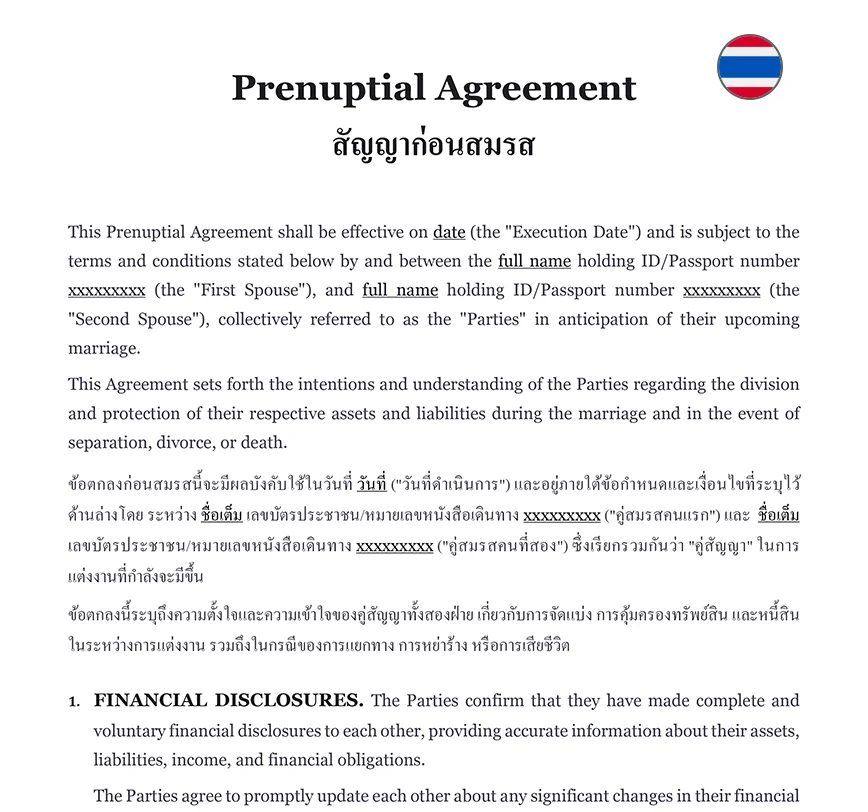Ready to use legal template
Drafted by experienced lawyers
Certified Thai-English translation
Ready to use legal template
Drafted by lawyers
Translated in Thai-English
Home › Family Law › Prenuptial Agreement
Learn more about Prenuptial Agreement in Thailand
A Prenuptial Agreement in Thailand is a legal arrangement that allows couples to define the distribution of their assets and liabilities in the event of divorce or separation. This essential document provides clarity and security for both parties, ensuring a fair and transparent process during challenging times. At Themis Partner, we recognize the importance of a well-crafted Prenuptial Agreement and offer a convenient solution – an editable legal template meticulously drafted by experienced lawyers, fully compliant with Thai legal standards.
Table of contents
-
What is a Prenuptial Agreement and why is it important?
-
Are Prenuptial Agreements enforced by Law in Thailand?
-
How does it protect assets and property rights?
-
Can foreigners in Thailand make a Prenuptial Agreement?
-
What does a Prenuptial Agreement include?
-
Is it possible to amend a Prenuptial Agreement after marriage?
What is a Prenuptial Agreement and why is it important?
A Prenuptial Agreement, commonly known as a prenup, is a legally binding contract signed by individuals before marriage. It outlines how assets, finances, and other matters will be handled in the event of divorce, separation, or a spouse’s death. Prenups are important for asset protection, financial clarity, debt allocation, spousal support, property division, and safeguarding family assets. They provide customized arrangements, conflict avoidance, legal certainty, and encourage open financial communication within marriages. Consultation with legal experts ensures a well-drafted and legally valid prenup that protects both parties’ interests and complies with relevant laws.
Are Prenuptial Agreements enforced by Law in Thailand?
Yes, Prenuptial Agreements are legally recognized and enforced by law in Thailand. The legal framework for prenups is provided under the Thai Civil and Commercial Code, specifically in Sections 1465 to 1470. Key points regarding the enforcement of prenuptial agreements in Thailand:
1. Voluntary Agreement: For a prenup to be valid, both parties must enter into the agreement voluntarily and without coercion.
2. In Writing: Prenups must be in writing and signed by both parties in the presence of at least two witnesses.
3. Contents: Prenups can cover a wide range of matters, including the division of assets, property, finances, debts, spousal support, and other related issues.
4. Limitations: Prenups cannot include provisions that violate public order or good morals. For example, agreements that incentivize divorce or unfairly disadvantage one party might not be upheld.
5. Registration: While it is not mandatory to register a prenup with a government authority, registration can provide additional evidence of its existence and terms.
6. Enforcement: Prenups are generally enforced by Thai courts as long as they meet the legal requirements and are not considered unfair or contrary to public policy.
How does it protect assets and property rights?
A Prenuptial Agreement (prenup) in Thailand serves as a powerful legal tool to protect assets and property rights by outlining clear terms and conditions regarding the division, ownership, and management of marital and separate assets. Here’s how a prenup can provide asset protection and safeguard property rights:
1. Asset Identification
A Prenuptial Agreement requires both parties to disclose their respective assets and properties before marriage. This ensures that each party’s pre-existing assets are properly documented and accounted for.
2. Separate Property
A prenup can specify which assets are considered separate property and will remain the sole possession of the original owner in the event of divorce or separation. This helps prevent marital property laws from applying to these assets.
3. Division of Marital Property
The Prenuptial Agreement can define how marital property will be divided in case of divorce. This allows couples to agree on a distribution that is fair and acceptable to both parties, rather than relying on default laws that might not align with their wishes.
4. Debt Protection
The prenup can establish how marital debts will be allocated. This is particularly important to protect one spouse from being responsible for the other’s pre-existing debts.
5. Business Interests
If one or both parties own a business, the prenup can address how the business will be treated in case of divorce. This may include provisions on valuation, ownership, and management.
6. Inheritance Rights
The Prenuptial Agreement can address how inheritance rights will be handled, ensuring that assets received through inheritance are treated as separate property and not subject to division.
7. Spousal Support
The prenup can outline the terms of spousal support (alimony) in case of divorce, providing clarity on financial responsibilities.
8. Future Property
By addressing these aspects in a prenup, couples can establish a comprehensive and customized framework for the management and protection of their assets and property rights. This helps prevent disputes, uncertainties, and potential conflicts in case the marriage does not continue as planned.
The Prenuptial Agreement can address how property acquired during the marriage will be classified and divided.
Can foreigners in Thailand make a Prenuptial Agreement?
Yes, foreigners in Thailand can make a Prenuptial Agreement (prenup). The Thai Civil and Commercial Code allows both Thai nationals and foreigners residing in Thailand to enter into prenuptial agreements before getting married. Prenups are recognized and enforced by law in Thailand, regardless of the nationality of the parties involved.
Foreigners who are planning to marry a Thai national or another foreigner in Thailand can create a prenup to outline the terms and conditions of asset division, property rights, financial matters, and other relevant aspects in the event of divorce or separation.
What does a Prenuptial Agreement include?
Certainly! A Prenuptial Agreement is a legally binding contract that outlines financial and property arrangements for a couple planning to marry. While content may vary, prenups cover asset division, separate and marital property, financial obligations, inheritance, spousal support, business interests, and more. They cannot violate public order, encourage divorce, or undermine fairness.
Is it possible to amend a Prenuptial Agreement after marriage?
It is indeed possible to amend a Prenuptial Agreement (prenup) after marriage through a process called a “postnuptial agreement.” Both spouses must mutually agree on the changes, adhere to legal formalities, provide full financial disclosure, and consider seeking independent legal advice. The postnuptial agreement can address updated assets, properties, and financial situations, and it may modify specific terms or replace the original prenup entirely.
Prenuptial AgreementTemplate (.docx)
Save on attorney fees
310 client reviews (4.8/5) ⭐⭐⭐⭐⭐
Share information
Why Themis Partner?
Easy legal documents at your fingertips
Make trusted documents for hundreds of purposes.
Hundreds of documents
Instant access to our entire library of documents for Thailand.
24/7 legal support
Quick legal advice from our network of qualified lawyers.
Easily customized
Editable Word documents, unlimited revisions and copies.
No translation fees
Certified Thai-English translation included for all documents.
Legal and Reliable
Documents written by lawyers that you can use with confidence.
Free consultation
Free lawyer consultation on each new matter.




